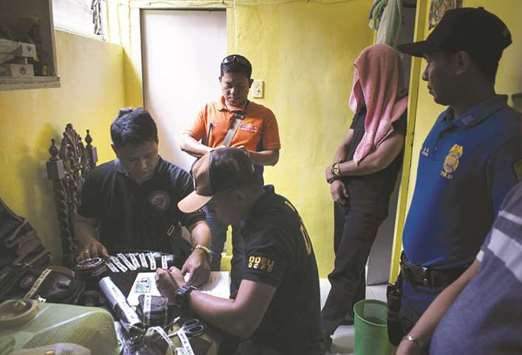The International Criminal Court (ICC) in The Hague has informed the Philippine government that it will investigate allegations of extrajudicial killings under its campaign against illegal drugs. President Rodrigo Duterte welcomed the examination of the allegations, his spokesman Harry Roque said yesterday.
“Our mission in The Hague was informed that the Office of the Prosecutor of the International Criminal Court is opening a preliminary examination on the alleged acts associated with the campaign against illegal drugs,” Roque told reporters.
“The president welcomes the preliminary examination because he is sick and tired of being accused,” he added. Roque said Duterte was willing to face the court should the case go ahead, adding: “If need be, he will argue his case personally and face the ICC.”
But Roque stressed that the preliminary examination is not yet an official probe and merely aims to “determine if there is reasonable basis to proceed with a formal investigation.” “We view of course this decision of the prosecutor as a waste of the court’s time and resources,” he added. Roque said that there was no case against Duterte because the campaign against illegal drugs “is an exercise of police power in dealing with the pernicious problem of drug trafficking in the Philippines.”
“As a sovereign state, the Philippines has the inherent responsibility to protect its current and future generations by effectively addressing threats of the safety and well-being of its citizens such as proliferation of illegal drugs,” he said.
A Filipino lawyer had filed a case accusing Duterte and 11 other senior officials of mass murder in April 2017 over the killings of criminal and drug suspects which have taken place in the Philippines since he became president on June 30, 2016. The lawyer, Attorney Jude Sabio, represented a self-confessed hitman for Duterte while he was still the mayor of the southern city of Davao. “I am elated and vindicated. At last, Mr Duterte and his cohorts will face preliminary examination by the ICC prosecutor as a prelude to formal criminal investigation,” Sabio said in a statement.
“I am confident that based on my communication, we will hurdle this first big step, and hopefully a warrant of arrest will be issued by the ICC against Duterte and his cohorts,” he added.
At least 3,987 people were killed in police operations against drug suspects between July 2016 and January 17, 2018, according to official data. But the New York-based Human Rights Watch has noted that estimates by local human rights and church groups place the death toll at up to 13,000 people, including those suspected to have been murdered by hired or vigilante killers. Duterte’s critics hailed the ICC’s decision as the first step in exacting accountability from the government and finding justice for the victims of the drug war.
“This development should jolt Duterte into realising that he is not above the law,” said opposition Senator Antonio Trillanes.”More importantly, this is the first step for the victims’ families’ quest for justice.” Cristina Palagay, secretary general of Philippine human rights group Karapatan, added: “Such independent investigations should be conducted in the light of the stubborn refusal of the Duterte administration to be subjected to scrutiny.” The Duterte administration has denied condoning extrajudicial killings under the campaign against illegal drugs. Officials say that those killed had fought back and violently resisted arrest.
Duterte has vowed in the past that the killings would only end if people stopped using and trading illegal drugs. He said there are as many as 4mn drug addicts in the Philippines, where crystal methamphetamine, locally known as shabu,
which allegedly comes mostly from China, is the most widely used narcotic.

Police investigate drug paraphernalia discovered as a suspect (second right) covers his face after a drug raid in Manila yesterday.
